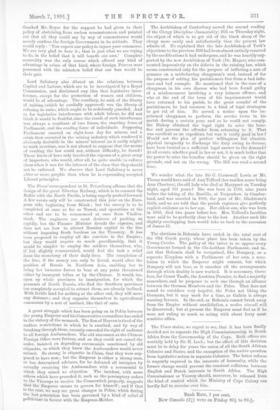The Archbishop of Canterbury moved the second reading of the
Clergy Discipline (Immorality) Bill on Thursday night, the object of which is to get rid of the black sheep of the clergy more easily and satisfactorily than the present law admits of. He explained that the late Archbishop of York's objections to the previous Bill had been almost entirely removed by the modifications it had undergone, and he was heartily sup- ported by the new Archbishop of York (Dr. Magee), who com- mented impressively on the defects in the existing law, which seems constructed only for the purpose of inflicting a sort of penance on a misbehaving clergyman's soul, instead of for the purpose of setting his parishioners free from a bad influ- ence and bad example. He mentioned that in the ease of clergyman in his own diocese who had been found guilty of a misdemeanour involving a very heinous offence, and who at the end of the term of his imprisonment would have returned to his parish, to the great scandal of the parishioners, be had recourse to a kind of legal stratagem to get rid of him. He served a notice upon the im- prisoned clergyman to perform the service twice in his parish during a certain year, and as he could not comply, the Bishop obtained the legal right to seize the bene- fice and prevent the offender from returning to it. That was excellent as an expedient, but was it really good in law P Would not the plea of perfect willingness but absolute physical incapacity to discharge the duty owing to duresse, have been treated as a sufficient legal answer to the demand? At all events, whether good in law or not, it is much better that the power to seize the benefice should be given on the right grounds, and not on the wrong. The Bill was read a second time.






































 Previous page
Previous page